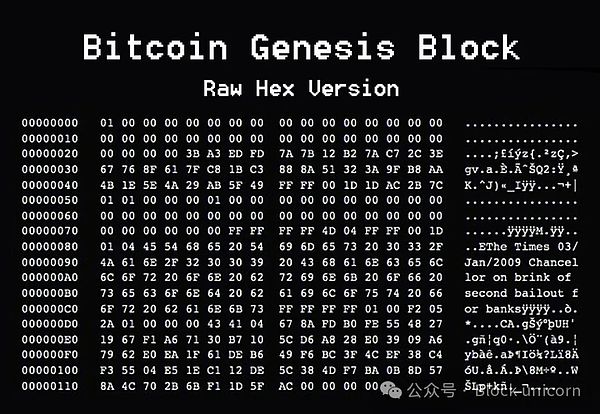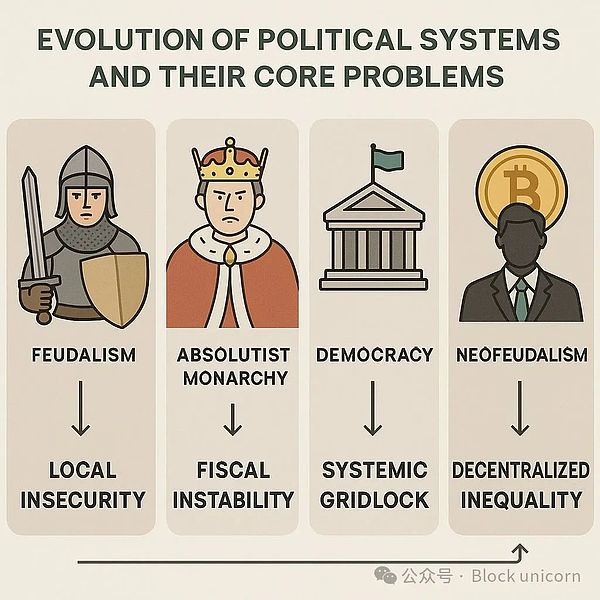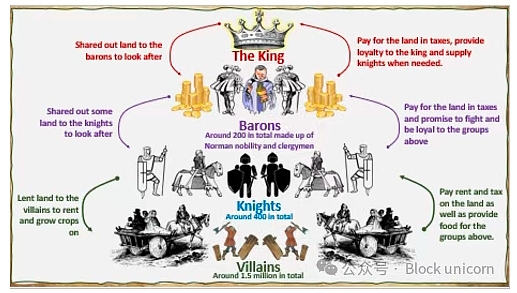Author: Tulip King, Compiler : Block unicorn
Foreword
Content coin is a scam, This is also self-inflicted. Decentralized finance (DeFi) is not better than traditional finance (TradFi), it's just different. Feudalism will replace the modern state.
Cryptocurrency is regulatory arbitrage
Let’s be frank: if governments weren’t saddled with massive debt and bankrupt, if the Fed wasn’t enriching the upper class by printing money, if governments weren’t bailing out failing companies, or if governments cared about lowering inflation and raising wages, there would be no need for cryptocurrencies. Bitcoin wasn’t born out of some divine mathematical inspiration. Bitcoin was born out of disgust. Satoshi Nakamoto’s message in the genesis blockwasn’t cryptic: “Chancellor about to do second bailout for banks.” This wasn’t a random headline — it was a deliberate provocation to a system that refused to let creative destruction run its course after 2008.

Bitcoin Genesis Block vs. Newspaper Headlines
There was a tipping point where the government could have chosen to let the economy run on its own. They could have chosen to let the banks fail, let the businesses fail, and embrace creative destruction. It would have been painful, but we would have been better off in the long run. Unfortunately, the baby boomers are completely incapable of self-sacrifice and are determined to kick the problem into the future until they all die and it’s no longer their problem (which, to be fair, I’d probably do, too).
The crypto ecosystem didn’t invent new finance; it invented a new platform. By moving familiar services — payments, lending, market making — into nominally “permissionless” code, projects are exploiting the void left by the overly regulated post-2008 framework.
Look at DeFi: it’s mostly about recreating traditional financial services without the compliance costs. Lending? Compound or Aave are examples. Options and derivatives? Look at dYdX or Synthetix. Exchanges? Uniswap is just a market maker with a better UX and no KYC. The innovation is not in the services, but in providing them permissionlessly.
Unless mainstream regulation becomes more accommodative, this cat-and-mouse game of innovation through arbitrage will persist. We didn’t revolutionize finance. We just moved it to a jurisdiction with fewer police officers.
Not better, just different
You need to think of economics, politics, and technology as dynamic and responsive systems. They are really all the same thing - human coordination mechanisms, constantly evolving to solve any imminent existential threat. Human societies are constantly rewriting their "rules of the game" to solve the most pressing problems of the moment,
so it makes no sense to rank any system by a single criterion
.
History Lesson:
Feudalism: Arose at the fall of the Roman Empire, when Europe lacked standing armies or reliable roads. By mortgaging their lands to the military, lords were able to quickly build small-scale defenses against Viking and Magyar raids, providing peasants with protection that distant crowns could not. It wasn’t “primitive” — it was a rational response to division and insecurity.
Absolute monarchy: Arose in the 17th century to finance the huge costs of standing armies of artillery and musketeers. By centralizing taxation and judicial power, the “fiscal-military state” was able to mobilize revenue and manpower quickly enough to survive great power wars. Kings weren’t “evil” — they were a solution to the problem of increasingly expensive war funding.
Mass democracy: Developed to govern industrial societies. Industrialization concentrated educated workers in cities, expanding wealth. Wider suffrage made taxation, conscription, and public education politically sustainable under these new social pressures. Democracy wasn’t “progress” so much as an adaptation.

The evolution of political systems and their core issues
As threats, technologies, and social norms evolve, so too does the “right” political order. A system that protected farmland in 1000 or funded the military in 1700 could never manage railroads and factories in 1900. Judging these systems outside the context in which they were created is like asking whether a plow or a microchip is the “better” tool — it all depends on the job at hand. This means that crypto is not better than our current financial system, it’s just different and hopefully better suited to the times we live in.
I’m almost a crypto fanatic. I think crypto is a better fit for the current economic/political/technological environment than any other solution. We will win. But it’s unrealistic to assume that crypto won’t create as many problems as it solves. You can, or should, expect these problems to grow over the next few hundred years until they completely change the world again.
Unintended Consequences
It turns out that when you give people permissionless capital markets, the first thing they do is cheat each other. It’s both funny and sad. The real consequences of crypto are already here, and they’re not all good:
Theft and Hacking: North Korea’s Lazarus Group stole an estimated $1.7 billion in crypto in 2022 alone. Think about it, a rogue nation with nuclear weapons hacking your DeFi protocol to fund its weapons program. In traditional finance, at least there are mechanisms to freeze accounts and recover stolen funds. In crypto? Haha, the money is gone. “Code is law” sounds great until someone finds a bug in your code and wipes out your life savings in an instant.
Lost Funds: Self-custody means being your own bank, which sounds empowering until you realize most people are just not very good at being banks. About 20% of all Bitcoins are permanently lost because people lost their private keys, forgot their passwords, or sent to the wrong address. No customer service, no refunds, no FDIC insurance. Just permanent, irreversible loss. Your funds are not “safe” — they are one hardware failure or brain short away from being gone.
Hyper-financialization: We are rapidly adding price data to everything. People are tokenizing themselves — literally minting personal tokens tied to their reputation or output. Soon, your Twitter followers, personal brand, and even your connections may have trading pairs and order books. Think about how you feel when your value as a person is publicly priced for speculation? When your personal “stock” plummets 40% because of a bad opinion? When your value as a person becomes as volatile as a meme coin?
These are not bugs, they are features. The permissionless feature that frees you from government control also lets scammers get away with it. The self-custody feature that frees you from banks also saddles you with unbearable security responsibilities. The tokenized feature that creates new funding models also commoditizes human existence.
Freedom has a sharp edge. Many of those who cry out for liberation don’t know what to do once they are free.
The New Feudalism
You need to think about what this means if Bitcoin (and cryptocurrencies) succeed. It means we will move money and markets completely out of the hands of the state. A literal separation of money and state. This will reshape society on a scale comparable to the separation of church and state. The modern state is so dependent on controlling money that once that control is lost, the state is doomed to collapse completely.
Without control of money, the state loses its main lever of power:
They can’t enforce taxes effectively
They can’t control monetary policy
They can’t impose financial sanctions
They can’t fund social programs or the military
What fills this power vacuum? I imagine the modern state will be replaced by something more akin to feudalism. Let’s call it neo-feudalism. Neo-feudal societies will exist as patronage systems, with crypto moguls sitting on top of small personal empires (I kid you not).

Study the Patronage System in Feudal Societies
This isn’t radical theory — it’s already here. Look at how the major protocols work. The largest token holders have a disproportionate influence on governance. Large holders can single-handedly decide the fate of proposals. Founders are treated with near-religious reverence. Discord servers have a strict hierarchy from “OGs” to the newbies.
Incorporate Balaji Srinivasan’s concept of “cyber-nations” — essentially cloud communities with their own currencies, governance, and possibly even physical territory. These aren’t “nations” in the traditional sense. They’re digital fiefdoms with charismatic leaders, loyal followers, and sources of wealth and power that operate outside of traditional jurisdictions.
When money exists under neutral protocols rather than state control, power will be concentrated in the hands of those who control capital, not elected officials. Crypto billionaires will become the new feudal lords, offering protection, opportunities, and resources to those who join their networks. They won’t call themselves “lords” — they’ll be founders, thought leaders, or protocol governors. But this dynamic will sound familiar to medieval historians.
Think I’m exaggerating? We’ve seen crypto moguls rescue entire protocols, create personal venture funds larger than the GDP of some countries, and amass followers who do their bidding. The pieces of a neo-feudalism are taking shape: concentrated wealth, personal loyalty networks, privatized security and governance, and diminishing state power.
This system may be more meritocratic and more fluid than old feudalism. You can “pledge allegiance” to different cyber-states with a few clicks of a mouse, without having to be born a serf. But its underlying power dynamics—powerful holders of capital providing security and opportunity to loyal cyber-participants—will be strikingly medieval.
Summary of Advice
My advice remains the same. In a world dominated by cryptocurrencies, where individuals are empowered without the constraints of today’s mega-states—you need to be a remarkable individual. You need to work like hell to amass wealth and build your own little empire.
Specifically:
Maximize your skills and reputation. In a neo-feudal world, your value comes from what you can do, not your credentials or job title. Focus on becoming the best at something that people need. Even in feudal times, skilled craftsmen, engineers, and strategists could always find protection. Build a public, traceable reputation that follows you across networks.
Accumulate hard assets across systems. Don’t go all in on the old world or the new. Hold Bitcoin to protect against state collapse, but also own gold, productive land, and income-generating investments. Cross-system hedging is the safest strategy when the world restructures.
Actively build your network. Start cultivating your own “micro-empire” now. This can be a Discord community, a DAO, or simply a strong network of great allies. In the new feudalism, your security comes from your network. Lone wolves get eaten up, and strong networks thrive.
Develop self-sovereignty skills. Learn operational security, self-custody best practices, and independent living skills. The protection of large institutions may not last forever. Those who can manage their own security (digital and physical) will have a huge advantage.
Position near power. If you can’t be the lord, be a trusted advisor or lieutenant. In any political system, those who are close to power benefit the most. Find promising protocols, communities, or cyber-states, and become an integral part of them early on.
The underlying fact is that the skills needed to prepare for the new feudalism are the same ones needed to succeed in crypto now: self-reliance, technical proficiency, network building, and capital accumulation.
Whether we end up in a true neo-feudal landscape or simply in a more fragmented world of competing systems, those who discern this shift early and position themselves accordingly will thrive. Those who cling to old assumptions about how wealth and power work will struggle.
Crypto promises freedom from the constraints of the state. And it may indeed deliver on that — with all the responsibilities, dangers, and power dynamics that come with true freedom. Be careful what you wish for.
 Catherine
Catherine
 Catherine
Catherine Davin
Davin Kikyo
Kikyo Alex
Alex Clement
Clement Catherine
Catherine Kikyo
Kikyo Clement
Clement Catherine
Catherine Clement
Clement